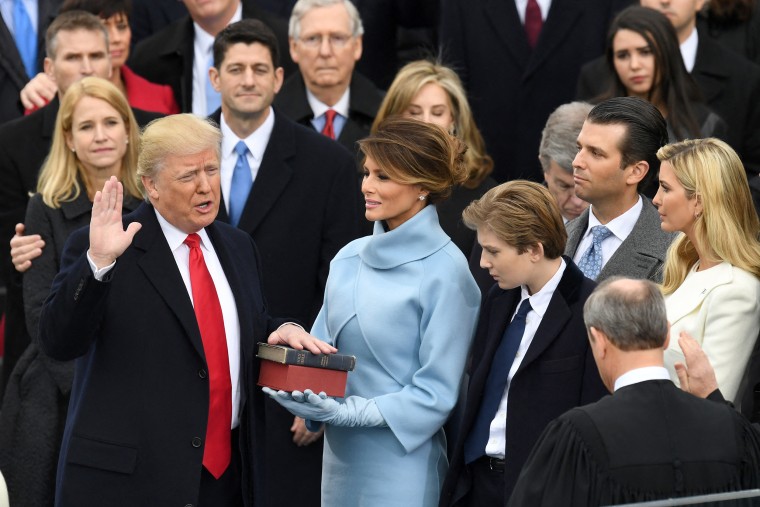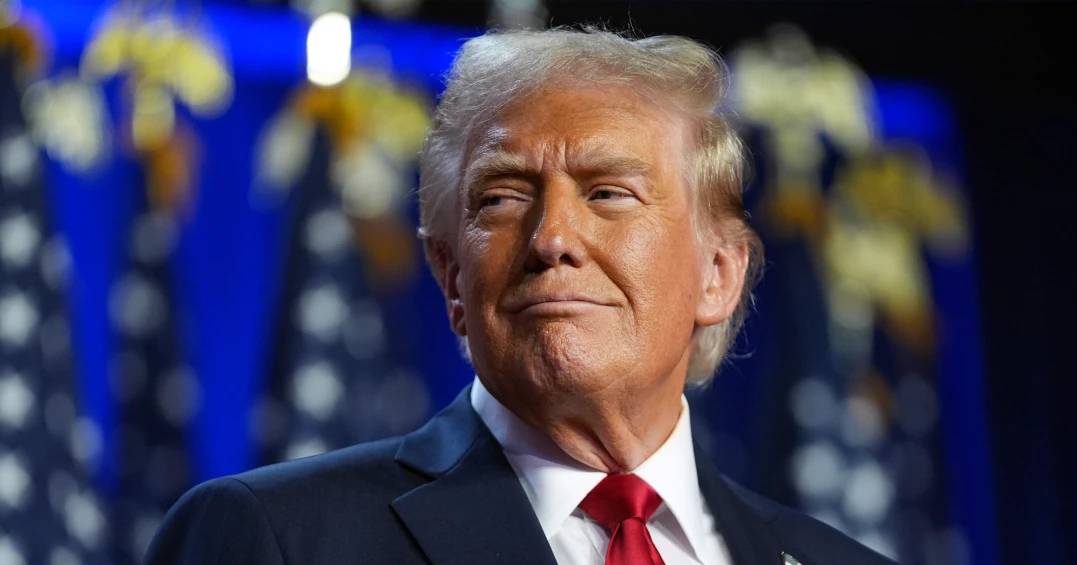WASHINGTON — Two centuries’ worth of political experience suggests Donald Trump should be sitting behind the lectern Monday watching someone else be sworn in rather than taking the oath himself.
He left the White House after leading a botched attempt to retain power despite his defeat in the 2020 election. Later, he was indicted four times and convicted of 34 felony counts in a New York criminal case that involved hush money payments to a porn star before the 2016 election.
When he announced three years ago that he would make one more run for the presidency, a normally friendly newspaper, the New York Post, dismissed his latest foray with the cheeky headline, “Florida Man Makes Announcement”; the story ran on page 26.
That was then.
Trump, 78, will complete his improbable comeback at noon, becoming the first former president to lose re-election and return to power four years later since Glover Cleveland in 1893.
That he’s getting a second term — and a second chance — attests to his singular blend of political instinct and perseverance, coupled with the nation’s deep polarization. His loyal base never gave up on him, even when fellow Republican politicians had seen quite enough.
Capitalizing on voters’ frustration with high prices, Trump persuaded them that he — the billionaire celebrity with the private jet and palatial homes — was the one candidate who wouldn’t forget them when he regained power.
He swept all seven swing states and, on top of that, won the popular vote. Driving his candidacy were the same character traits that many Democrats found so objectionable: his willingness to flout convention, shatter norms and shake up a federal bureaucracy that seemed unmoored from Americans’ day-to-day concerns.
Millions of voters wanted someone who wouldn’t play nice, and in the often belligerent, foul-mouthed Trump they saw their impolitic champion.
“Trump remained popular because the Republican base still wants to see a pugilist in that role,” said Brandon Rottinghaus, a political science professor at the University of Houston. “All odds would have pointed to the Republican Party cutting ties with Trump. But his ability to rally the base — and keep his finger on the pulse of where most committed Republicans were — led him to a second term.”
Luck played a part, too. Because he turned his head to peer at a chart at just the right moment, an assassin’s bullet bloodied his ear rather than piercing his skull during a campaign rally last summer in Butler, Pennsylvania.
Trump faced weak opposition in both the 2016 and ’24 races. An aged and infirm President Joe Biden abruptly abandoned his campaign in July, leaving his chosen successor, Vice President Kamala Harris, just four months to mount a viable candidacy.
“Trump may be the luckiest politician in my lifetime,” Whit Ayres, a Republican pollster, said. “The guy is just incredibly lucky!”
Trump will enter office with abundant political capital to spend as he chooses. His party controls both the House and Senate, albeit by slim margins. House Speaker Mike Johnson, R-La., owes his position to Trump. So do many Republican lawmakers who received Trump’s coveted endorsement.
For their part, Democrats are in despair and disarray, with Biden’s approval rating languishing in the 30s and his historical legacy tarnished by his party’s stinging defeat.
“We became a party that’s out of touch — that listens and talks to elites,” said Chris Kofinis, a Democratic strategist. “Until we start actually listening to working- and middle-class Americans about their problems — and focus on bread-and-butter issues and start talking in a normal way about those issues — we’re going to face continuing political blowback.”
With Biden bowing out, Trump filled the power vacuum in the interregnum that followed the Nov. 5 election, making pronouncements from his oceanfront resort in Palm Beach, Florida.
He said he wanted the U.S. to acquire Greenland.
And Canada.
And the Panama Canal.
Hitting the caps lock key on his social media platform, he warned there would be “ALL HELL TO PAY” if the hostages held by Hamas weren’t released. He dispatched his Middle East envoy, Steven Witkoff, to help reach the ceasefire deal between Israel and Hamas that was announced last week.
Watching from foreign capitals, world leaders were back in the posture of deciphering what Trump really meant and planned to do. Were his threats real or merely bluster? The question first posed nine years ago gained renewed urgency: Should Trump be taken seriously, literally or both? A Canadian official surmised that Trump’s call to make Canada the 51st state was a joke — and a bad one at that.
“We see this as positioning,” the official said in an interview. “President-elect Trump is a businessman and a negotiator, and a lot of the threats have been linked to things around the border that he wants to see changed.”
“We will not become a 51st state. That’s a nonstarter,” the official continued. “At first, this was seen as a joke. We don’t really see it as funny anymore. The joke has run its expiry date.”

Donald Trump is sworn in as president at the U.S. Capitol on Jan. 20, 2017.Mark Ralston / AFP via Getty Images file
The hardest part begins midday, when the 45th president becomes the 47th. Trump set the bar high for himself, promising a plethora of changes from Day 1.
In an interview with NBC News’ “Meet the Press” moderator Kristen Welker on Saturday, Trump said he planned to sign a “record-setting” number of executive actions upon taking office.
He has vowed to deport massive numbers of immigrants living illegally in the U.S. He said he would bring an end to the war between Russia and Ukraine within “24 hours” of his inauguration, if not sooner.
When Welker asked him last month if he still planned to end birthright citizenship on his first day in office, Trump said, “Absolutely.”
None of this will be easy. Trump’s foreign policy team has not yet laid out a peace proposal to Ukraine’s leadership, sources close to Ukraine’s government told NBC News.
Birthright citizenship is enshrined in the 14th Amendment and can’t be undone either by law or executive order, legal experts say.
“Of course it’s not legally permissible to end birthright citizenship either by executive order or by an act of Congress,” said Laurence Tribe, a constitutional law professor emeritus at Harvard University. “Only a constitutional amendment changing the language of the 14th Amendment could make that fundamental alteration in our national legal and political system.”
Ultimately, Trump’s most politically consequential challenge may be lowering prices. Cumulative inflation under Biden topped 20%, compared to less than 8% in Trump’s first term — one reason a hopeful electorate put him back in charge.
If Trump can’t give Americans some relief at the gas pump and grocery store, he could face a backlash in the midterm elections in 2026.
Resetting expectations, Trump told Time magazine in an interview a couple of weeks after his victory, “I’d like to bring them [grocery prices] down. It’s hard to bring things down once they’re up. You know, it’s very hard.”
The midterms in 2026 will prove to be a reckoning for Trump. Democrats are hopeful the elections will mark the start of their revival. If they regain control of the House and Senate, they’ll be in a position to thwart Trump’s judicial nominations and legislative agenda. Further, they’d enjoy subpoena power, enabling them to launch investigations into Trump’s dealings. Worried about that prospect, the Republican National Committee is already thinking ahead to the looming elections.
“If we let Democrats seize back control of the House and the Senate, everything changes,” RNC Chairman Michael Whatley told members at the party’s winter meeting on Friday. “The radical left will waste no time putting the brakes on President Trump’s agenda. They will resurrect the worst excesses of lawfare that we have dealt with for the last eight years.”
“We would see headlines about impeachment proceedings and useless Democrat political stunts,” Whatley added. “We cannot let that happen again.”
Whatever happens, Trump has already carved a unique place in the long arc of America’s experiment in self-government. Had he lost in November, his first term might have been perceived as a one-off, a reaction to the cautious centrism that his 2016 opponent, Hillary Clinton, symbolized.
His return demonstrated that Trumpism was a genuine and powerful movement. Whether it endures when Trump finally leaves the stage is another question.
“Let’s face it. Donald Trump is sui generis,” Ayres said. “There’s no one out there like him. No one with his mix of bravado, charisma, political instincts and entertainment value on the horizon in either party. It’s hard to imagine Trumpism without Donald Trump.”
Hard for Trump to imagine, either. At a campaign stop in Michigan toward the end of the race, he speculated about who might succeed him in 2028.
“In four years, somebody will come down, and that person’s going to be hot as a pistol,” he said. “And you know what? They’re going to draw about 300 people.”



